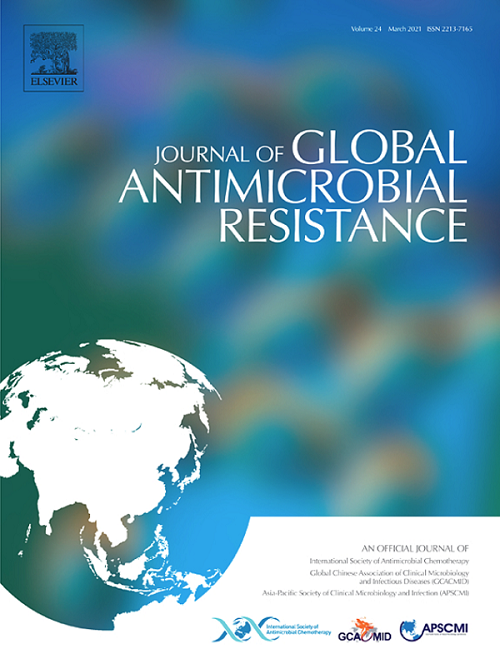头孢他啶-阿维巴坦治疗中国医院获得性肺炎(包括呼吸机相关性肺炎)的有效性和安全性:一项多中心、开放标签的4期研究
IF 3.2
3区 医学
Q2 INFECTIOUS DISEASES
引用次数: 0
摘要
背景:基于多国3期REPROVE研究,头孢他啶-阿维巴坦被批准用于医院获得性肺炎(HAP)患者,包括呼吸机相关性肺炎(VAP)。本研究评估头孢他啶-阿维巴坦治疗中国成人HAP/VAP的疗效和安全性。方法:这是一项前瞻性、多中心、开放标签的4期研究,在中国42个地点进行。HAP/VAP患者给予头孢他啶-阿维巴坦2.5 g,每8小时静脉滴注2小时,连续7-14天。主要疗效终点是临床修正治疗意向(cMITT)分析集中治愈试验(TOC)访问时的临床反应。次要终点包括TOC(微生物修饰的意向治疗)的微生物反应;[mMITT]分析集)和TOC和第28天的全因死亡率。对结果进行描述性总结。结果:257名筛选个体中,235名接受头孢他啶-阿维巴坦治疗(安全性分析集);男性占71%;中位年龄为67岁。肺炎克雷伯菌(n = 49[61.3%])和铜绿假单胞菌(n = 16[20.0%])是最常见的基线病原菌。在cMITT分析集中,62.7%的患者在TOC达到临床治愈(131/209,95% CI:[56.0, 69.0])。51.3% (41/80, 95% CI:[40.4, 62.0])的患者在TOC时出现了良好的微生物反应(mMITT分析集)。全因死亡率为5.7% (12/209;95% CI: 3.2, 9.6)在TOC和第28天(cMITT分析集)。没有发现新的安全信号。结论:头孢他啶-阿维巴坦对中国HAP/VAP患者有效,结果与REPROVE 3期研究结果一致。这些发现支持使用头孢他啶-阿维巴坦作为中国成人HAP/VAP的潜在治疗选择。本文章由计算机程序翻译,如有差异,请以英文原文为准。
Effectiveness and safety of ceftazidime-avibactam in Chinese patients with hospital-acquired pneumonia, including ventilator-associated pneumonia: A Phase 4, multi-centre, open-label study
Background
Ceftazidime-avibactam was approved in patients with hospital-acquired pneumonia (HAP), including ventilator-associated pneumonia (VAP), based on the multinational Phase 3 REPROVE study. This study assessed efficacy and safety of ceftazidime-avibactam in Chinese adults with HAP/VAP.
Methods
This was a Phase 4, prospective, multi-centre, open-label study, conducted at 42 sites in China. Patients with HAP/VAP received ceftazidime-avibactam 2.5 g by 2-h IV infusion every 8 h for 7–14 d. Primary efficacy endpoint was clinical response at the test-of-cure (TOC) visit in the clinical modified intent-to-treat (cMITT) analysis set. Secondary endpoints included microbiological response at TOC (microbiological modified intent-to-treat analysis set) and all-cause mortality at TOC and D 28. Results were summarized descriptively.
Results
Of 257 screened individuals, 235 were treated with ceftazidime-avibactam (safety analysis set); 71% were male; median age was 67 y. Klebsiella pneumoniae (n = 49 [61.3%]) and Pseudomonas aeruginosa (n = 16 [20.0%]) were the most frequently isolated baseline pathogens. Clinical cure at TOC was achieved in 62.7% patients (131/209, 95% confidence interval [CI]: [56.0, 69.0]) in the cMITT analysis set. Favourable microbiological responses at TOC occurred in 51.3% (41/80, 95% CI: [40.4, 62.0]) patients (microbiological modified intent-to-treat analysis set). All-cause mortality was 5.7% (12/209; 95% CI: 3.2, 9.6) at TOC and D 28 (cMITT analysis set). No new safety signals were identified.
Conclusions
Ceftazidime-avibactam was effective in Chinese patients with HAP/VAP, and results were consistent with the Phase 3 REPROVE study. These findings support the use of ceftazidime-avibactam as a potential treatment option in Chinese adults with HAP/VAP.
求助全文
通过发布文献求助,成功后即可免费获取论文全文。
去求助
来源期刊

Journal of global antimicrobial resistance
INFECTIOUS DISEASES-PHARMACOLOGY & PHARMACY
CiteScore
8.70
自引率
2.20%
发文量
285
审稿时长
34 weeks
期刊介绍:
The Journal of Global Antimicrobial Resistance (JGAR) is a quarterly online journal run by an international Editorial Board that focuses on the global spread of antibiotic-resistant microbes.
JGAR is a dedicated journal for all professionals working in research, health care, the environment and animal infection control, aiming to track the resistance threat worldwide and provides a single voice devoted to antimicrobial resistance (AMR).
Featuring peer-reviewed and up to date research articles, reviews, short notes and hot topics JGAR covers the key topics related to antibacterial, antiviral, antifungal and antiparasitic resistance.
 求助内容:
求助内容: 应助结果提醒方式:
应助结果提醒方式:


